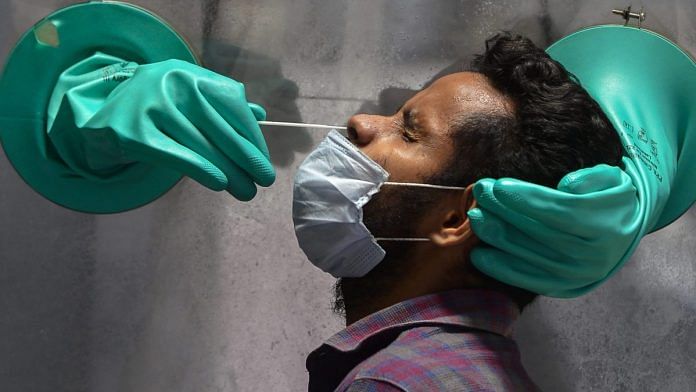New Delhi: Almost 70 per cent of ‘low-risk’ Covid-19 patients have impairment in one or more organs four months after initial symptoms of SARS-CoV-2 infection, according to a new study from the UK.
In a paper, which is yet to be peer reviewed, researchers from Oxford University Hospitals, Mayo Clinic Healthcare and the University College, London, among others looked at 201 Covid patients in the UK with a mean age of 44 after they had recovered from the infection.
Among the participants in the study, prevalence of pre-existing conditions such as obesity, hypertension, diabetes and heart disease was low. Only 18 per cent of individuals in the study had been hospitalised with Covid.
While there have been reports of people suffering from symptoms like fatigue and brain fog after recovering from Covid infections, the researchers claim that the study is the first to evaluate medium-term impairment across multiple organs following SARS-CoV-2 infection.
The study has implications for the burden of long Covid — which refers to the long-term consequences of coronavirus infection — in the younger population.
So far, public health approaches have assumed low risk in young people with no comorbidities and focussed on protecting older adults who are at increased risk of death from Covid.
Also read: Health insurance premiums have nearly doubled this year, but Covid alone not to blame
Impairment risks
The study shows that symptoms and blood tests did not give any clues about which patients were more likely to suffer from organ impairment.
Heart and lung impairment were just as prevalent in low-risk individuals with long Covid as the older counterparts. Fatigue, shortness of breath, muscle pain, headache and joint pain are some of the symptoms that the team found were more likely to persist four months after Covid infection.
“The good news is that the impairment is mild, but even with a conservative lens, there is some impairment, and in 25% of people it affects two or more organs,” Amitava Banerjee, associate professor at University College London and one of the authors of the story told The Guardian.
“This is of interest because we need to know if [the impairments] continue or improve — or if there is a subgroup of people who could get worse,” he added.
The researchers emphasise the need for further multi-organ assessment, including blood and imaging analysis in the Covid context, so that long Covid can be properly defined.
“As the search for effective Covid-19 vaccines and treatments continues, potential and real long-term multi-organ consequences of SARS-CoV-2 infection in low-risk individuals reinforce the central importance of minimising infection through social distancing, wearing of masks, physical isolation and other population-level measures,” the researchers wrote in the study.
In India, researchers from the Council of Scientific and Industrial Research (CSIR)’s Institute of Genomics and Integrative Biology in New Delhi are currently recruiting participants for studying long Covid.
Also read: Delhi to double RT-PCR tests, add Covid beds, Amit Shah says after meeting Kejriwal




@Deepak
Do you mean “relay on” (pass on) or “rely on” (depend on)?
Either way, the answer may be that that’s where the study is being conducted.
Do you know of any good reason why we should not rely on or relay this study because it’s being conducted in the UK?
Why to relay on UK study…..?